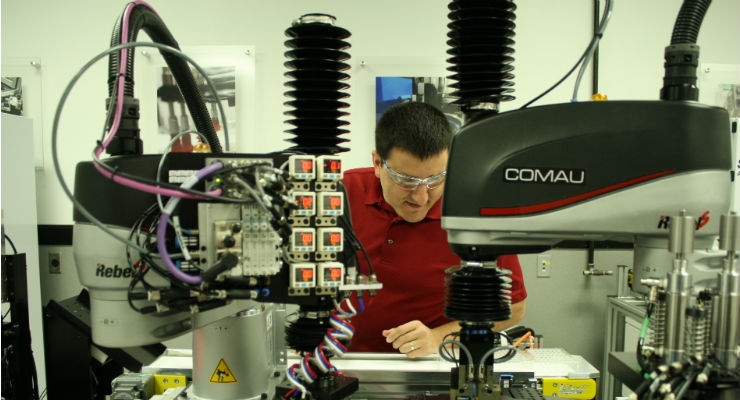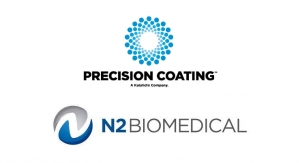Mark Crawford, Contributing Writer10.16.18
Assembly and automation in the medical device industry are going strong as OEMs continue to outsource these services to contract manufacturers (CMs). Services vary widely from project to project, depending on production volume, device complexity, materials, and end-use application. Like other segments of the industry, assembly and automation are keenly focused on minimizing or eliminating variables that can impact product quality, increase costs, and slow down time to market. To help OEMs achieve these goals, CMs must remain open to new ideas and approaches, and be willing to invest in equipment or technologies when needed to be responsive to client demands—for example, implementation of Industry 4.0 and the Internet of Things (IoT) to integrate operations, parts, workstations, and other tasks in a seamless manner across the factory floor.
“Running a manufacturing facility can be compared to conducting an orchestra, where you’re synchronizing and timing things that come together to produce a quality result,” said Tom Hoover, senior marketing manager for medical and business consumer electronics for Automation Solutions at Emerson, a provider of automation technologies in Danbury, Conn.
In particular, automation is a key IoT technology that helps the manufacturing orchestra run smoothly. OEMs rely on automation to maximize quality through consistent assembly of parts, precise placement for smaller or high-precision medical products, and speed of manufacturing for large volumes. Sensors, big data, and predictive analytics can analyze machine performance and maximize production, throughput, and maintenance.
Miniaturization and increasing complexity of medical devices create new challenges for assembly and automation, which can be highly specific depending on performance parameters. Vendors with new technologies and specialized services are now moving into this field and competing with more established players.
“Assembly and automation in the medical device industry is becoming a very crowded space,” noted Steven Jacobsen, process development engineering manager for MICRO, a Somerset, N.J.-based medical device manufacturer. “As the industry itself accelerates, so does the number of new vendors, technologies, and services that cater to the field.”
Although this creates more competition among component and automation vendors, potential buyers of these technologies or services must also be increasingly vigilant in their choices. “For example,” Jacobsen added, “it may be worthwhile to step back and ask if it is really worth it to save a couple of cubic feet in cabinet space on an automated assembly line, in exchange for an unstable, minimally tested, low serial number motion control package. The benefit must be weighed against the risk on a case-by-case basis.”
Besides ensuring quality, another top goal of OEMs is saving money wherever possible, and only investing in new tools, methodologies, and technologies when needed. For example, more OEMs are using design for manufacturability (DFM) because they realize it significantly reduces overall costs by maximizing quality and speed. OEMs seek suppliers willing to engineer custom assemblies and solutions that reduce the number of components in a medical device, accelerating time to market. They also look for suppliers that can provide more services, thereby streamlining operations and shortening the supply chain, further reducing costs.
Cost reduction is even more center stage as U.S. trade policies take hold, with unknown ramifications. To prepare, “the medical device industry is working hard to understand and map out how the tariffs might impact supply chain and demand,” said Colin Rademacher, area sales manager of microfluidics for Bürkert Fluid Control Systems, a Charlotte, N.C.-based manufacturer of measurement and control systems for liquids and gases.
Assembly and Automation Trends
As medical device manufacturers (MDMs) increase production of smaller, higher-precision parts and products, with greater focus on quality and compliance, some of them are pulling manufacturing back to the U.S. for production. Part variety and complexity continue to expand, forcing manufacturers to do more short-volume runs with fast changeovers. As parts become lighter weight, smaller, and thinner in every dimension, assembly and automation technologies must advance as well. For example, ultrasonic welding—a key assembly technology that is in high demand for a variety of devices, including wearable or implantable devices such as hearing aids, insulin pumps, and various sensors—continues to evolve to meet smaller-scale, high-precision needs. More medical devices also utilize embedded electronics, which require a variety of weld tests to ensure there are no negative impacts to electronics performance.
“Smaller parts have smaller weld joints, which must bond lesser amounts of material with thinner walls, smaller contact surfaces, and finer edges,” explained Tarick Walton, global product manager of ultrasonics for Automation Solutions at Emerson.
The need to bond smaller, lighter, and increasingly delicate plastic parts is also driving innovation, requiring ultrasonic welders to provide greater precision and tunable control over increasingly less actuation force—the force that pushes down on the interface between two plastic parts and triggers the start of the welding process. “With smaller, thinner-walled parts, even just a little excess force can crack the part, damage the weld joint, or negatively over-weld the plastic part,” continued Walton.
OEMs are hungry for automation solutions that allow them to deliver the same results and quality from batch to batch, sample to sample, and surgery to surgery. Automation applications range from manufacturing processes to packaging to how end users interact with the product. Improved force sensors enhance high-precision placement applications, which have deviation based on part tolerances, tooling, pick-up precision, and other factors, or situations where vision alone cannot solve the precision requirements. Add-on automated modules can relieve operators of tasks that are mundane, ergonomically challenging, or require demanding inspections. Fully articulating, six-axis robots are replacing simpler Cartesian-type robots because they can perform a full range of motions and handle a wider range of tasks in small work areas. Some manufacturers are developing pre-built blank six-axis robotic cells with integrated drawers for loading of components or turntables outside of the working area of the robot. These range in size and configuration as well; some also include rotary tables and belt-driven conveyors.
“Dynamic collaborative robotic systems are also on the way,” stated Jacobsen. “No longer does a system have to be considered purely collaborative or not. These new cells utilize laser-based area scanners to allow the robot to act more like a standard robotic arm when humans are not detected in the area. Once the scanner detects movement, the system slows and torque limits are changed so that the system can then qualify as collaborative.”
Automation is not just for large-volume jobs; low to mid-volume programs can also benefit from automation and assembly work cells. Robot and operator-loaded laser marking work cells, for example, can eliminate the problems and costs associated with other methods of applying artwork. They are safe, dependable, repeatable, and eliminate the need for laborious set-ups and post-decorating drying and out-gassing precautions. Automation is also essential for making high-value and life-sustaining products—for example, pacemakers, where product quality must be essentially perfect. Although people can produce at this level, the possibility of human error is always present, which can only be eliminated through automation.
There is also strong interest in integrated systems for motion control—for example, integrated servo motors/drives/controllers with Ethernet/IP and various other communication platforms. “This technology allows for compact systems where the motors can be ‘daisy-chained’ together to carry power, control, and safety signals,” said Jacobsen. “Although this reduces the size of some systems, it can also cause communication issues, noise problems, and machine downtime.”
Augmented/mixed reality for assembly or repair will soon make its way to the assembly line. Augmented lenses can display and overlay specifications or instructions, eliminating the need for a physical book, which speeds up the process and reduces user error. An example is the use of a mixed-reality headset like the Magic Leap that, when connected to a server, tracks an assembly technician’s movements with real-time feedback, instructional overlays, and error proofing of movements. “Microsoft HoloLens also offers similar technology that is waiting for more widespread adoption,” explained Jacobsen.
OEMs Seek Quality Control
Two requests typically at the top of an OEM wish list are 1) shorter time to market, from initial design to commercial production, and 2) higher quality and repeatability in manufacturing processes. “OEMs also ask for increasingly flexible manufacturing, characterized by rapid production changes, ability to produce multiple products or product variations on the same line, and ability to vary/increase production rates,” stated Hoover.
OEMs want to work with suppliers that complement their own operations by being flexible, adaptable, and serving as a remote factory or an extension of the OEM itself, fully prepared to integrate with the OEM’s culture and quality assurance/quality control and other compliance systems. OEMs also want proof their CMs are using world-class, fully validated assembly and automation techniques and processes. They want to know numbers, such as the CM’s PPM, or “parts per million defective.” “OEMs want to see that data, do a quality audit before suppliers start producing parts, and meet with the contract manufacturer’s quality manager,” said Rademacher. “An increasing number of OEMs are doing their homework to eliminate risk ahead of time, before committing to a supplier.”
Rademacher also noted that OEMs are looking to their suppliers to implement “Copy Exact Chain Control” in their assembly process on previously non-critical items. OEMs want to be notified ahead of time if there is going to be a change to any product or process that impacts form, fit, or function—no matter how small the change is—so it doesn’t impact their customer’s experience. “This requires suppliers to automate nearly every process in an effort to eliminate any human errors,” explained Rademacher.
OEM requests for manufacturing data continue to rise for a number of reasons, including improving productivity, process efficiency, product quality, and regulatory compliance. Companies, for example, want to track and trace all data outputs from welders for validation purposes—creating unbroken product traceability through a data stream that begins at the moment of welding and extends through product delivery. It can be difficult and cumbersome to monitor multiple machines and communicate consistently with the operators. In these situations, “a focal quality point is to tie multiple welders—and all their channels of incoming weld data—into the factory data system so that the customer/process manager can read and respond to that data stream, or retain it to meet FDA requirements or other requirements regarding manufacturing or traceability,” indicated Walton.
OEMs can further drive improvements in quality, efficiency, and speed to market by utilizing DFM. This involves including their assembly and automation partners in the design stage as early as possible to help develop and implement DFM product platforms. Successful DFM requires working with a variety of factors, not just those related to product or component design. Manufacturing production volumes are a pivotal driver in DFM thinking. For example, if an OEM wants to automate assembly for a product with extremely high production requirements (20 million or more), DFM will reveal the design must use parts that automation equipment can readily inspect, handle, and assemble. The parts must be able to tolerate automated handling and dispensing, and mechanisms and actuators must be simple and robust.
“True DFM must include design for automation,” revealed Al Neumann, automated manufacturing systems manager for SMC, a Somerset, Wis.-based medical device contract manufacturer. “Even small up-front changes in part or device design can have large impacts on automated work cell complexity and robustness. For example, on clear parts, it is important to consider molded features that facilitate successful machine vision inspection. Also, not all programs can justify the cost of a fully automated production process, but sometimes even low-volume programs benefit from inclusion of automation solutions—DFM can tell us that.”
“We’re often asked on a regular basis to help automate assembly using welding,” added Hoover. “But to do that, we have to look back in the process. How are parts going to be fed to the welder? How are they going to be molded? What is the part composition—material and or glass filler content? Is the geometry of the part compatible with the weld process?”
All these questions need to be evaluated in the DFM stage. The earlier an automation supplier can confer with the OEM, the better. “If design or part changes are needed to support automation, OEMs will want to make them early, before making major equipment and tooling investments,” said Hoover.
Assembly and Automation Continue to Evolve
Emerging markets and new designs are driving innovation in the medical device industry. For example, wearables require flexible components and stretchable circuits, resulting in research into new conductive materials, 3D printing methods, and compact battery sizes. In the rapidly expanding field of point-of-care (POC) medical devices, advances are being made in battery capacity, circuits, and efficient consumption of electricity. Components are engineered to operate with the lowest power ratings possible. The efficient use of space is especially important for portable and POC devices. This also means that a device’s fluidic system components must also be downsized, yet still deliver the performance the OEM expects.
In POC testing devices, scaling down both the fluidics and the chemistry is not as simple as just making things smaller. Chemical reactions often behave differently as the volume is decreased. “In many cases, this has a positive effect on performance—for example, reactions often proceed more rapidly in small volumes, with less reagent consumption,” stated Don McNeil, market development manager for Parker Precision Fluidics, a Hollis, N.H.-based industrial equipment manufacturer, including medical devices. Once the chemistry is scaled down, the next challenge is designing a compact, reliable, and cost-effective cartridge to contain the reagents and reactions. These require miniaturized, high-performance components such as pumps and valves. “High-precision flow control is required for the samples and reagents as they make their way through the different reaction chambers within the POC testing cartridge,” said McNeil. “Electronic pressure controllers are also available to provide precise pressure control.”
Ultrasonic welding is becoming the preferred approach for attaching small, delicate, or complex-shaped parts, or different materials, in smaller and more complex devices. Advanced models deliver lighter and more precise weld actuation (trigger) force, providing users with an advanced, multi-tiered actuation control system that allows them to select and tune actuation methods to match even extremely low actuation force requirements. Advanced welding machines can also capture and store comprehensive data (serial numbers, data registers, and signatures) for up to 100,000 welds, “providing OEMs with comprehensive, unique device identification (UDI)-compliant data for welded parts, backed by a validated, time-stamped audit trail,” stated Hoover.
Although it is more an intriguing possibility than a reality for MDMs, IoT is gaining attention, especially as a way to maximize product quality, streamline production, and reduce overall costs. Next-generation assembly and automation equipment is now being designed for an Industry 4.0 world, complete with barcode readers, remote service and support, robotic interfaces, Ethernet connectivity, factory protocols, and comprehensive data outputs for statistical process and product quality control.
New architectures for machine automation combine electronic valve manifolds, IO-Link technology [a short distance, industrial communications link], smart sensors, and wireless diagnostics to produce pneumatic control systems with enhanced capabilities. These new technologies can deliver data from sensors directly into a machine control system, or diagnostics into a mobile device, in a highly efficient manner.
“The flexibility of IO-Link-capable sensors allows machines to operate more effectively by providing the controller with advanced diagnostics,” indicated Tony Gaglio, product marketing manager for analytical and medical, fluid and motion control for Automation Solutions at Emerson. “In addition to standard functions such as product detection or temperature, smart sensors can provide detailed and accurate health status to improve asset uptime and increase machine productivity.”
“The proliferation of IO Link in many facets of automation equipment, such as sensors and solenoid valves, allows OEMs to start the deployment of IoT technologies,” added Brian Romano, manager of controls, engineering, and IT for Bristol, Conn.-based Arthur G. Russell Company, a manufacturer of custom automation assembly systems. “The next IoT steps are gathering the data, analyzing the data, and applying that knowledge to improve manufacturing processes and add value for the customer.”
Perhaps the biggest appeal of IoT for MDMs is the speed it offers. OEM design engineers struggle with compressed product development times as they strive to be first to market. There is constant pressure on CMs to deliver engineered component samples and/or prototypes in a matter of weeks—OEMs will not tolerate waiting months for component suppliers to provide integrated solutions or concepts. With embedded sensors, additive manufacturing, automation, artificial intelligence, and hardware and software advances, including cloud resources, IoT has the tools to transform the manufacturing landscape—delivering higher-quality products to market much more quickly—all at a lower cost. MDMs and CMs that embrace IoT and Industry 4.0—even in a limited way—will have a distinct market advantage over their competitors.
Ultimately, OEMs want to have confidence that their assembly and automation solutions will not only work, but “also be robust, especially regarding precision and performance, so they can put out high-quality products as quickly as possible,” concludes Rick Brookshire, group product manager for Epson Robots, a Carson, Calif.-based manufacturer of computer-controlled precision factory automation robot solutions. “Everyone is being pushed to build systems faster, so taking the time to determine the right automation or assembly approach early in the design process is critical for maximum success.”
Mark Crawford is a full-time freelance business and marketing/communications writer based in Madison, Wis. His clients range from startups to global manufacturing leaders. He also writes a variety of feature articles for regional and national publications and is the author of five books.
“Running a manufacturing facility can be compared to conducting an orchestra, where you’re synchronizing and timing things that come together to produce a quality result,” said Tom Hoover, senior marketing manager for medical and business consumer electronics for Automation Solutions at Emerson, a provider of automation technologies in Danbury, Conn.
In particular, automation is a key IoT technology that helps the manufacturing orchestra run smoothly. OEMs rely on automation to maximize quality through consistent assembly of parts, precise placement for smaller or high-precision medical products, and speed of manufacturing for large volumes. Sensors, big data, and predictive analytics can analyze machine performance and maximize production, throughput, and maintenance.
Miniaturization and increasing complexity of medical devices create new challenges for assembly and automation, which can be highly specific depending on performance parameters. Vendors with new technologies and specialized services are now moving into this field and competing with more established players.
“Assembly and automation in the medical device industry is becoming a very crowded space,” noted Steven Jacobsen, process development engineering manager for MICRO, a Somerset, N.J.-based medical device manufacturer. “As the industry itself accelerates, so does the number of new vendors, technologies, and services that cater to the field.”
Although this creates more competition among component and automation vendors, potential buyers of these technologies or services must also be increasingly vigilant in their choices. “For example,” Jacobsen added, “it may be worthwhile to step back and ask if it is really worth it to save a couple of cubic feet in cabinet space on an automated assembly line, in exchange for an unstable, minimally tested, low serial number motion control package. The benefit must be weighed against the risk on a case-by-case basis.”
Besides ensuring quality, another top goal of OEMs is saving money wherever possible, and only investing in new tools, methodologies, and technologies when needed. For example, more OEMs are using design for manufacturability (DFM) because they realize it significantly reduces overall costs by maximizing quality and speed. OEMs seek suppliers willing to engineer custom assemblies and solutions that reduce the number of components in a medical device, accelerating time to market. They also look for suppliers that can provide more services, thereby streamlining operations and shortening the supply chain, further reducing costs.
Cost reduction is even more center stage as U.S. trade policies take hold, with unknown ramifications. To prepare, “the medical device industry is working hard to understand and map out how the tariffs might impact supply chain and demand,” said Colin Rademacher, area sales manager of microfluidics for Bürkert Fluid Control Systems, a Charlotte, N.C.-based manufacturer of measurement and control systems for liquids and gases.
Assembly and Automation Trends
As medical device manufacturers (MDMs) increase production of smaller, higher-precision parts and products, with greater focus on quality and compliance, some of them are pulling manufacturing back to the U.S. for production. Part variety and complexity continue to expand, forcing manufacturers to do more short-volume runs with fast changeovers. As parts become lighter weight, smaller, and thinner in every dimension, assembly and automation technologies must advance as well. For example, ultrasonic welding—a key assembly technology that is in high demand for a variety of devices, including wearable or implantable devices such as hearing aids, insulin pumps, and various sensors—continues to evolve to meet smaller-scale, high-precision needs. More medical devices also utilize embedded electronics, which require a variety of weld tests to ensure there are no negative impacts to electronics performance.
“Smaller parts have smaller weld joints, which must bond lesser amounts of material with thinner walls, smaller contact surfaces, and finer edges,” explained Tarick Walton, global product manager of ultrasonics for Automation Solutions at Emerson.
The need to bond smaller, lighter, and increasingly delicate plastic parts is also driving innovation, requiring ultrasonic welders to provide greater precision and tunable control over increasingly less actuation force—the force that pushes down on the interface between two plastic parts and triggers the start of the welding process. “With smaller, thinner-walled parts, even just a little excess force can crack the part, damage the weld joint, or negatively over-weld the plastic part,” continued Walton.
OEMs are hungry for automation solutions that allow them to deliver the same results and quality from batch to batch, sample to sample, and surgery to surgery. Automation applications range from manufacturing processes to packaging to how end users interact with the product. Improved force sensors enhance high-precision placement applications, which have deviation based on part tolerances, tooling, pick-up precision, and other factors, or situations where vision alone cannot solve the precision requirements. Add-on automated modules can relieve operators of tasks that are mundane, ergonomically challenging, or require demanding inspections. Fully articulating, six-axis robots are replacing simpler Cartesian-type robots because they can perform a full range of motions and handle a wider range of tasks in small work areas. Some manufacturers are developing pre-built blank six-axis robotic cells with integrated drawers for loading of components or turntables outside of the working area of the robot. These range in size and configuration as well; some also include rotary tables and belt-driven conveyors.
“Dynamic collaborative robotic systems are also on the way,” stated Jacobsen. “No longer does a system have to be considered purely collaborative or not. These new cells utilize laser-based area scanners to allow the robot to act more like a standard robotic arm when humans are not detected in the area. Once the scanner detects movement, the system slows and torque limits are changed so that the system can then qualify as collaborative.”
Automation is not just for large-volume jobs; low to mid-volume programs can also benefit from automation and assembly work cells. Robot and operator-loaded laser marking work cells, for example, can eliminate the problems and costs associated with other methods of applying artwork. They are safe, dependable, repeatable, and eliminate the need for laborious set-ups and post-decorating drying and out-gassing precautions. Automation is also essential for making high-value and life-sustaining products—for example, pacemakers, where product quality must be essentially perfect. Although people can produce at this level, the possibility of human error is always present, which can only be eliminated through automation.
There is also strong interest in integrated systems for motion control—for example, integrated servo motors/drives/controllers with Ethernet/IP and various other communication platforms. “This technology allows for compact systems where the motors can be ‘daisy-chained’ together to carry power, control, and safety signals,” said Jacobsen. “Although this reduces the size of some systems, it can also cause communication issues, noise problems, and machine downtime.”
Augmented/mixed reality for assembly or repair will soon make its way to the assembly line. Augmented lenses can display and overlay specifications or instructions, eliminating the need for a physical book, which speeds up the process and reduces user error. An example is the use of a mixed-reality headset like the Magic Leap that, when connected to a server, tracks an assembly technician’s movements with real-time feedback, instructional overlays, and error proofing of movements. “Microsoft HoloLens also offers similar technology that is waiting for more widespread adoption,” explained Jacobsen.
OEMs Seek Quality Control
Two requests typically at the top of an OEM wish list are 1) shorter time to market, from initial design to commercial production, and 2) higher quality and repeatability in manufacturing processes. “OEMs also ask for increasingly flexible manufacturing, characterized by rapid production changes, ability to produce multiple products or product variations on the same line, and ability to vary/increase production rates,” stated Hoover.
OEMs want to work with suppliers that complement their own operations by being flexible, adaptable, and serving as a remote factory or an extension of the OEM itself, fully prepared to integrate with the OEM’s culture and quality assurance/quality control and other compliance systems. OEMs also want proof their CMs are using world-class, fully validated assembly and automation techniques and processes. They want to know numbers, such as the CM’s PPM, or “parts per million defective.” “OEMs want to see that data, do a quality audit before suppliers start producing parts, and meet with the contract manufacturer’s quality manager,” said Rademacher. “An increasing number of OEMs are doing their homework to eliminate risk ahead of time, before committing to a supplier.”
Rademacher also noted that OEMs are looking to their suppliers to implement “Copy Exact Chain Control” in their assembly process on previously non-critical items. OEMs want to be notified ahead of time if there is going to be a change to any product or process that impacts form, fit, or function—no matter how small the change is—so it doesn’t impact their customer’s experience. “This requires suppliers to automate nearly every process in an effort to eliminate any human errors,” explained Rademacher.
OEM requests for manufacturing data continue to rise for a number of reasons, including improving productivity, process efficiency, product quality, and regulatory compliance. Companies, for example, want to track and trace all data outputs from welders for validation purposes—creating unbroken product traceability through a data stream that begins at the moment of welding and extends through product delivery. It can be difficult and cumbersome to monitor multiple machines and communicate consistently with the operators. In these situations, “a focal quality point is to tie multiple welders—and all their channels of incoming weld data—into the factory data system so that the customer/process manager can read and respond to that data stream, or retain it to meet FDA requirements or other requirements regarding manufacturing or traceability,” indicated Walton.
OEMs can further drive improvements in quality, efficiency, and speed to market by utilizing DFM. This involves including their assembly and automation partners in the design stage as early as possible to help develop and implement DFM product platforms. Successful DFM requires working with a variety of factors, not just those related to product or component design. Manufacturing production volumes are a pivotal driver in DFM thinking. For example, if an OEM wants to automate assembly for a product with extremely high production requirements (20 million or more), DFM will reveal the design must use parts that automation equipment can readily inspect, handle, and assemble. The parts must be able to tolerate automated handling and dispensing, and mechanisms and actuators must be simple and robust.
“True DFM must include design for automation,” revealed Al Neumann, automated manufacturing systems manager for SMC, a Somerset, Wis.-based medical device contract manufacturer. “Even small up-front changes in part or device design can have large impacts on automated work cell complexity and robustness. For example, on clear parts, it is important to consider molded features that facilitate successful machine vision inspection. Also, not all programs can justify the cost of a fully automated production process, but sometimes even low-volume programs benefit from inclusion of automation solutions—DFM can tell us that.”
“We’re often asked on a regular basis to help automate assembly using welding,” added Hoover. “But to do that, we have to look back in the process. How are parts going to be fed to the welder? How are they going to be molded? What is the part composition—material and or glass filler content? Is the geometry of the part compatible with the weld process?”
All these questions need to be evaluated in the DFM stage. The earlier an automation supplier can confer with the OEM, the better. “If design or part changes are needed to support automation, OEMs will want to make them early, before making major equipment and tooling investments,” said Hoover.
Assembly and Automation Continue to Evolve
Emerging markets and new designs are driving innovation in the medical device industry. For example, wearables require flexible components and stretchable circuits, resulting in research into new conductive materials, 3D printing methods, and compact battery sizes. In the rapidly expanding field of point-of-care (POC) medical devices, advances are being made in battery capacity, circuits, and efficient consumption of electricity. Components are engineered to operate with the lowest power ratings possible. The efficient use of space is especially important for portable and POC devices. This also means that a device’s fluidic system components must also be downsized, yet still deliver the performance the OEM expects.
In POC testing devices, scaling down both the fluidics and the chemistry is not as simple as just making things smaller. Chemical reactions often behave differently as the volume is decreased. “In many cases, this has a positive effect on performance—for example, reactions often proceed more rapidly in small volumes, with less reagent consumption,” stated Don McNeil, market development manager for Parker Precision Fluidics, a Hollis, N.H.-based industrial equipment manufacturer, including medical devices. Once the chemistry is scaled down, the next challenge is designing a compact, reliable, and cost-effective cartridge to contain the reagents and reactions. These require miniaturized, high-performance components such as pumps and valves. “High-precision flow control is required for the samples and reagents as they make their way through the different reaction chambers within the POC testing cartridge,” said McNeil. “Electronic pressure controllers are also available to provide precise pressure control.”
Ultrasonic welding is becoming the preferred approach for attaching small, delicate, or complex-shaped parts, or different materials, in smaller and more complex devices. Advanced models deliver lighter and more precise weld actuation (trigger) force, providing users with an advanced, multi-tiered actuation control system that allows them to select and tune actuation methods to match even extremely low actuation force requirements. Advanced welding machines can also capture and store comprehensive data (serial numbers, data registers, and signatures) for up to 100,000 welds, “providing OEMs with comprehensive, unique device identification (UDI)-compliant data for welded parts, backed by a validated, time-stamped audit trail,” stated Hoover.
Although it is more an intriguing possibility than a reality for MDMs, IoT is gaining attention, especially as a way to maximize product quality, streamline production, and reduce overall costs. Next-generation assembly and automation equipment is now being designed for an Industry 4.0 world, complete with barcode readers, remote service and support, robotic interfaces, Ethernet connectivity, factory protocols, and comprehensive data outputs for statistical process and product quality control.
New architectures for machine automation combine electronic valve manifolds, IO-Link technology [a short distance, industrial communications link], smart sensors, and wireless diagnostics to produce pneumatic control systems with enhanced capabilities. These new technologies can deliver data from sensors directly into a machine control system, or diagnostics into a mobile device, in a highly efficient manner.
“The flexibility of IO-Link-capable sensors allows machines to operate more effectively by providing the controller with advanced diagnostics,” indicated Tony Gaglio, product marketing manager for analytical and medical, fluid and motion control for Automation Solutions at Emerson. “In addition to standard functions such as product detection or temperature, smart sensors can provide detailed and accurate health status to improve asset uptime and increase machine productivity.”
“The proliferation of IO Link in many facets of automation equipment, such as sensors and solenoid valves, allows OEMs to start the deployment of IoT technologies,” added Brian Romano, manager of controls, engineering, and IT for Bristol, Conn.-based Arthur G. Russell Company, a manufacturer of custom automation assembly systems. “The next IoT steps are gathering the data, analyzing the data, and applying that knowledge to improve manufacturing processes and add value for the customer.”
Perhaps the biggest appeal of IoT for MDMs is the speed it offers. OEM design engineers struggle with compressed product development times as they strive to be first to market. There is constant pressure on CMs to deliver engineered component samples and/or prototypes in a matter of weeks—OEMs will not tolerate waiting months for component suppliers to provide integrated solutions or concepts. With embedded sensors, additive manufacturing, automation, artificial intelligence, and hardware and software advances, including cloud resources, IoT has the tools to transform the manufacturing landscape—delivering higher-quality products to market much more quickly—all at a lower cost. MDMs and CMs that embrace IoT and Industry 4.0—even in a limited way—will have a distinct market advantage over their competitors.
Ultimately, OEMs want to have confidence that their assembly and automation solutions will not only work, but “also be robust, especially regarding precision and performance, so they can put out high-quality products as quickly as possible,” concludes Rick Brookshire, group product manager for Epson Robots, a Carson, Calif.-based manufacturer of computer-controlled precision factory automation robot solutions. “Everyone is being pushed to build systems faster, so taking the time to determine the right automation or assembly approach early in the design process is critical for maximum success.”
Mark Crawford is a full-time freelance business and marketing/communications writer based in Madison, Wis. His clients range from startups to global manufacturing leaders. He also writes a variety of feature articles for regional and national publications and is the author of five books.




























